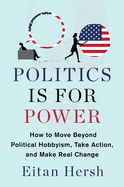
According to political scientist Eitan Hersh, many Americans who consider themselves politically engaged--keeping up with the news, watching satirical commentary about it or posting about it on social media--are involved in political hobbyism, rather than real, measurable work to create social change. He wondered if there could be a way to convert that hobbyism into meaningful civic engagement. (Hint: It can be done, but it's a tough pivot.) His second book, Politics Is for Power, examines the checkered history of political engagement in the U.S., tells the stories of several grassroots activists and asks how citizens can become involved in local politics to some effect.
Hersh (Hacking the Electorate) admits that most political "engagement" doesn't do much more than create a lot of noise online. He delves into American political communities, past and present, from the ward machines that once mobilized thousands of votes in large cities to pop-up "resistance" groups created following Trump's election. He explores the motivations for people to join such groups, and interviews citizens of various ages, races and genders who have quietly built robust local party committees and other groups in their communities. The conclusions are not glamorous, but neither are they surprising: real political engagement takes research, hard work, a willingness to commit time and effort, and (perhaps surprisingly) deep listening. Readers may not come away with a handy blueprint for civic engagement (there isn't one), but they will have a much better idea of what it takes to gain and wield political power. --Katie Noah Gibson, blogger at Cakes, Tea and Dreams

